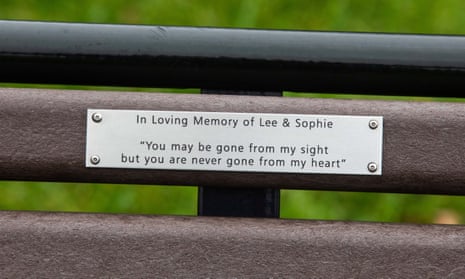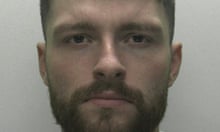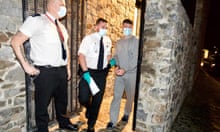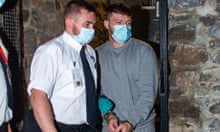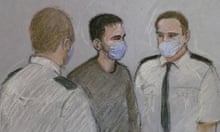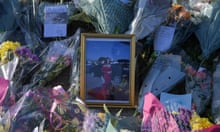There are tiny but telling hints of what happened in the Keyham area of Plymouth on 12 August last year. A stretch of freshly laid pavement at the corner where Jake Davison turned his pump-action shotgun on himself after killing five people. A pile of compost in a community garden, created from the thousands of flowers left for the victims and set aside to be used when memorial trees or flower beds are planted. The new bench in the park installed in memory of two victims.
“Everywhere you look there are awful memories,” said Hazel Lynch, a member of the Keyham neighbourhood watch, one of the groups leading the recovery from that evening in late summer when Davison, a 22-year-old apprentice crane operator who harboured extreme misogynistic views, carried out his 12-minute attack.
Lynch pointed out, for example, the area where the air ambulance had landed as children raced for safety and the spot where one boy sat for three whole days afterwards, trying to process what happened. “He wanted to be there and to try to understand what had happened. People are still doing that.”
The attack hit not just the relatives and friends of those affected but the whole community. Three hundred people, many of them children, directly witnessed Davison’s attack or the immediate aftermath. Children still struggle to sleep, worried the “bad man” will get them, while some elderly people are too frightened to leave their homes.
Many hundreds of personal alarms have been handed out to girls and women and Lynch said she now carries one for the first time in her life. “I wouldn’t go to the park by myself after dark now,” she said.
The city had scarcely caught its breath after Davison’s attack, which began with him killing his mother, Maxine, when a few miles away 18-year-old Bobbi-Anne McLeod vanished from a bus stop in the Leigham area of the city in November. Her body was found near a beach three days later, a second disturbing crime with a woman at its centre.
Much soul-searching has been prompted in Plymouth with the launch of a commission in the city to examine violence against women and girls. While crime figures overall are down in Devon and Cornwall, sexual attacks have risen. Stalking and harassment is up by 24% on 2019, rape by 18% and other sexual offences by 13.5%. Since September there have been more than 200 referrals to an app that allows people to highlight areas in Plymouth where they do not feel safe.
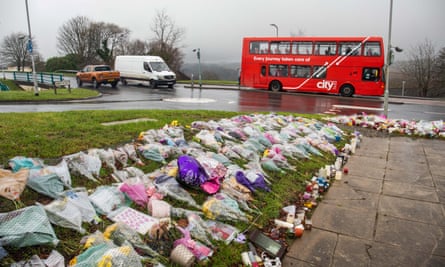
Millions of pounds are being spent to try to help make the city safer for girls and women through initiatives such as setting up new CCTV cameras, boosting the number of taxi drivers after a post-Brexit drop and introducing initiatives such as bystander training to help people know how to challenge bad behaviour.
Alison Hernandez, the police and crime commissioner for Devon, Cornwall and the Isles of Scilly, said a lot of work was being done but admitted girls and women were too often victims – and did not feel safe. “Although we have one of the safest force areas in the country, violent crime is rising. Bobbi-Anne’s death reminds us that policing must be relentlessly focused on making our communities safer, but we need to engage schools, local government and our public in that effort.”
She believes society needs to look deeply at problems ranging from the accessibility to young people of violent pornography to domestic abuse. “This is a problem that cannot be resolved by police officers alone,” she said.
Lyn Gooding, the chief executive of the charity First Light, which works with victims of domestic abuse and sexual violence, agrees. She told a Q&A organised by the new commission that work needed to be done in primary schools to help youngsters understand what a healthy relationship looked like. “We need to have difficult conversations with our young sons.”
For Keyham specifically, the Home Office has provided more than £800,000 for additional crime prevention measures and more policing and almost as much again has been made available in the area to pay for extra children’s social care workers and educational psychologists to work in schools.
So many Keyham people have a sad story to tell. Olivia, 15, who lives close to the spot where Davison killed himself, said she still thought often about his body slumped on the pavement. “It is still very difficult for a lot of people here,” she said.
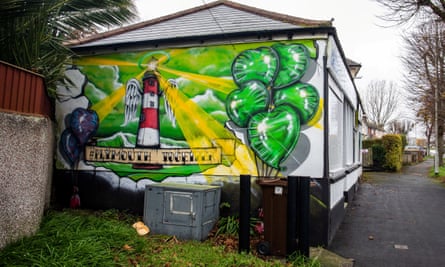
Rosemary, whose teenage son witnessed one of the shootings, said she feared his mental health had been compromised. “He is very confused. He finds it hard to understand what happened.”
The Labour MP for Plymouth, Sutton and Devonport, Luke Pollard, who lives half a mile from the scene, warned that tragedies could lead to long-running social problems such as children struggling at school, rising crime rates, more people suffering from depression. “A whole community, a whole city can be traumatised.”
He said people were beginning to ask more questions about the gun laws and in the new year a “Keyham manifesto” setting out what the area would like to be changed is due to produced.
Heather Welch, the acting operations manager for Victim Support in Devon, said the shock waves would be felt for many years. It has called for the experiences of survivors of the Manchester Arena attack and the Grenfell fire to learn how to help people in Keyham. “People have had to make sense of the world in a different way.”
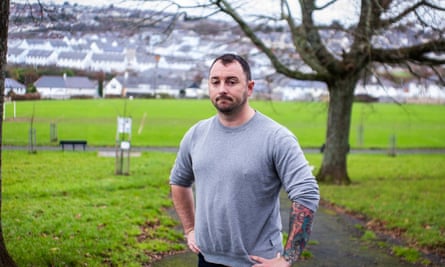
The politicians and experts are keen to flag up the great work being done by people such as Hazel Lynch, who is leading the transformation of a rickety old shed on the sports field where the shootings vigil took place into a community cafe, and the neighbourhood watch chairman, Kevin Sproston, who lives by the motto: “Let’s make Keyham as good as the people.”
He is still dashing around organising the Safer Keyham programme, which includes providing new security measures, such as better locks and peepholes, to try to make vulnerable people feel safer in their homes.
Richard Baron, the managing director of a double glazing company, said he and his team had improved the security at 150 homes, providing the materials at cost. “If we can help make people a bit safer then we’re very happy to do that,” he said. “It will take a long time for this community to heal.”
